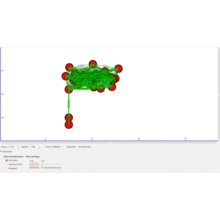Tag Archive: 'ns2 ns3'
As it has become the norm for cloud providers to host multiple datacenters around the globe, significant demands exist for inter-datacenter data transfers in large volumes, e.g., migration of big data. A challenge arises on how to schedule the bulk data transfers at different urgency levels, in order to fully utilize the available inter-datacenter bandwidth. […]
Cloud data center have to accommodate many users with isolated and independent networks in the distributed environment to support multi-tenant network and integrity. User applications are stored separately in virtual network. To support huge network traffic data center networks require software to change physically connected devices into virtual networks. Software defined networking is a new paradigm allows networks easily programmable that helps in controlling and managing virtual networkdevices. Flow decisions are made based upon […]
Availability-aware service provisioning tries to satisfy the availability requirements of clients on demand and can improve the resource efficiency in optical networks. This paper studies the problem of flexible availability-aware differentiated protection (ADP) in elastic optical networks (EONs). We first consider the unique features in EONs, e.g., flexible spectrum allocation and bandwidth-squeezed protection, describe the problem of ADP, […]
A software defined optical network based on multi-level WDM ring topology for intra data center switching is proposed. SDN-based unified control plane as well as the routing strategy are given, which make the control and management flexible. Analytical results show that the multi-level WDM ringnetwork structure has good scalability which can support about 256,000 servers under the assumption of each server […]
Cooperative Data Scheduling in Hybrid Vehicular Ad Hoc Networks: VANET as a Software Defined Network
This paper presents the first study on scheduling for cooperative data dissemination in a hybrid infrastructure-to-vehicle (I2V) and vehicle-to-vehicle (V2V) communication environment. We formulate the novel problem of cooperative data scheduling (CDS). Each vehicle informs the road-side unit (RSU) the list of its current neighboring vehicles and the identifiers of the retrieved and newly requested […]
Research on a Crowdsourcing Assignment Model based on Mobile Crowd Sensing in the Internet of Things
With the powerful sensing capability of mobile smart devices, users can easily obtained the crowd sensing services with smart devices in the Internet of Things. However, credible interaction issues between mobile users are still the hard problems in the past. In this paper, we focus on how to assign the crowdsourcing sensing tasks based on […]
Data Mining is the extraction of hidden predictive information from large databases. The process of discovering interesting, useful, nontrivial patterns from large spatial datasets is called spatial data mining. When time gets associated it becomes spatio temporal data mining. The study of spatio temporal data mining is of great concern for the study of mobile […]
The single greatest opportunity to improve health and reduce premature death lies in personal behavior. While technology-based behavior intervention has been around for many years, the emerging smartphone and wearable sensing technology brings great promise to push health behavior change further by inferring and predicting real-time behavior occurrence and its context. In this paper, we […]
This paper proposes a method for seamless interaction between students and their professor using Twitter, one of the typical social network service (SNS) platforms, in large lectures. During the lecture, the professor poses surprise questions in the form of a quiz on an overhead screen at unexpected moments, and students submit their answers through a smartphone response system […]
In this paper, a green wireless communication system in which base stations are powered by renewable energy sources is considered. This system consists of a capacity-constrained renewable power supplier (RPS) and a base station (BS) that faces a predictable random connection demand from mobile user equipments (UEs). In this model, the BS, which is powered […]

 Click Here to watch our latest output video using NS3 simulator
Click Here to watch our latest output video using NS3 simulator  Click Here to watch our latest projects screenshots using NS3 simulator
Click Here to watch our latest projects screenshots using NS3 simulator